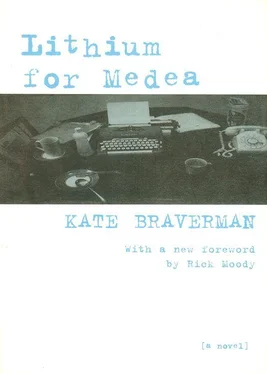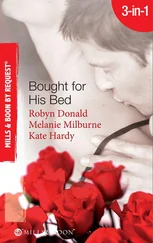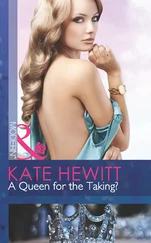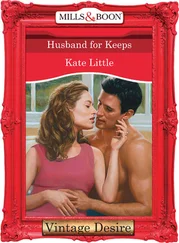“I asked him what kind of funeral he wanted. He said just bury him with his spikes on. He also wants to wear a 1927 Yankee baseball cap. He’s got one somewhere. You go in,” Francine said. Her eyes were very dark, very wide. She seemed to be gasping for air. “Maybe he’ll be better with you.”
I opened the door. My father was hooked up to oxygen again. The IV was back, taped and embedded in his hand. The skin on his arms was an unusual mottled yellow, his twenty-year California suntan collapsing in uneven streaks. The blinds were drawn. He was back on morphine. He watched me approach his bed through pitch-black too wide eyes.
DONT WANT THIS. He wrote the note with his left hand. His right hand had the IV. The note was an ugly black scrawl.
“You don’t want the hospital?” I was terrified. “Are you in pain? Do you want a shot?”
DONT WANT THIS STINKING LIFE. My father shoved the note at me.
I was standing near his bed unmoving, oddly frozen. I was a slab of ice bobbing in a cold empty stretch of too blue too deep sea. I felt my mother enter the room. Somewhere through a cold haze I saw my mother square her thin shoulders. She glanced down at my father’s notes. Then she walked across the room and pulled the blinds open. My father averted his face from the sudden rush of sunlight as if the sunlight hurt, a kind of yellow slap.
“You don’t want life?” Francine demanded. “Some example you set for your daughter.” My mother was pacing the small room. She crossed it, touched the window with her fingertips like a swimmer making contact with the poolside, and crossed the room again, another completed lap.
“You should have thought of that sooner. You wanted life plenty before the operation. What is this? A suicide threat?” She leaned over. She picked up my father’s note and studied it as if it were written in code. “Suicide? After the mice jumped on my head? After the things that happened to me? And her?” My mother pointed to me. “You would set that kind of example for your daughter? You know this kid is sick already.”
CANT STAND THIS. My father handed me the note. For a moment I considered the possibility that he might be talking about Francine.
“You weren’t expecting a picnic, were you? Remember the first time?” Francine asked. “It was worse. The cobalt. Remember? You don’t remember. The mind forgets. You’ll get better. Trust me.”
My father pointed at Francine. Then he pointed at the door. My mother stared at him.
“I think he wants you to leave,” I suggested. “Get some coffee downstairs.”
I sat down lightly on my father’s bed. I could see the outline of his body beneath the sheet. His legs were thickly bandaged where skin had been removed from his thighs. The red plastic feeding tube was still attached to his nose. Three times a day a nurse held the feeding tube in her hand and poured in a thick brownish liquid from a jar. They didn’t even call it eating. “Time for your feeding,” they would say. Feeding, as if he were a dog or a plant.
My father was looking down at the gray tiled floor. Maybe he was tracing the pattern the sun made spilling lazy, slowly swaying and uncurling. My father closed his eyes.
“Daddy, what happened? They said you were shadowboxing in the corridor last night. They put you in a strait jacket?” I handed my father his pad. I handed my father his felt-tipped pen.
DONT REM. FRIGGING DRUGS? SAW DEATH GOT UP?
“You saw death? You got out of bed?”
FIGHT BASTARD BIG.
“Death’s big?”
My father nodded his head. His eyes seemed a kind of black liquid.
“But you saw death before. The first time around. You lived through it, remember?”
He had lived twenty years waiting for it to recur, waiting for the black ambush.
But he had found a way of coping. He played horses in the sunlight. He sat near a water fountain in front of the outside odds board, mountains in the background, Santa Anita. He watched the odds board lights flicker and the water falling, butterflies brushing their wings against the spray, the odds changing, a bed of orange and purple pansies like a circle of bruises around the round fountain with the names of the champions engraved on the sides. Native Diver. Round Table. Swaps. Omaha. Man o’ War.
The sun would be setting above the bamboo garden gate. My father would read the form sheet for the next day. He sat on a chaise longue at dusk with the form sheet across his lap and the wild black grapes rustling, slowly growing near the side of the house. The house would be a pale yellow pastel lost in the pastel twilight. He would bring out the radio. The Dodgers would play while he hosed the apricot tree and the lemon tree and the orange tree. And they would breed for him.
And his daughter? In the distance, through pastel layers, his daughter grew into a strained and crippled womanhood. A senseless womanhood. My life was a stain. Did he see it as a retribution and blame himself?
I picked up his hand. I wanted to say forgive me for failing you. Forgive me for giving you no grandchildren, no son-in-law. My father had longed for a son-in-law, a regular guy, he called it, a regular guy who would call him up to go for a pastrami sandwich and watch a fight. Instead I gave him Gerald. Instead I gave him Jason.
I gave my father nothing, not even the sense that he could leave me safely flowing in time, once a daughter and then a mother. I had spent my girlhood wearing a secret sneer inside. No one came with corsages. No crisp introductions to fine upright young men who knew how to bring a fifth of Scotch with them and planned on becoming dentists or building contractors and marrying me.
I brought him the blue denim brigade. I brought him foot soldiers from the revolution, the crusaders of the new order. They were scarred by visions of irredeemable hells. Or the other, some green-wooded Mendocino paradise of redwood branches and leaves falling across the insides of their eyes and remaining embedded there forever.
I had ignored his firm history. I had labeled his experience irrelevant. It meant no more to me than the rubber plants growing along the back gate or the shower of bougainvillaea above the barbecue. And he watched in the pastel distance as I slipped away into my darkness and wild manias. My teen-age years were a blood clot of savage unnecessary rage. He must have sensed this.
My father’s hand was thin, sculpted to the bone. What was he thinking?
“You got up to fight death off?” My father nodded. “I’m proud of you, Daddy. You fought death off man to man. You did the right thing. Primitive people, people in tribes, get up to shout and jab out the evil spirits. You did a natural thing. Don’t be ashamed.”
AM DYING.
I had never seen him so pale. His hands, suntanned from years of sitting at Southern California race tracks, where it is always hot and sunny and the track is always fast and even cripples run six in 1:10 and change, were ashen now. His chin was a frosted gray. White hairs pushed out from the bandages between the feeding tube and the green tube attached to the metal thing embedded in his throat.
I remembered that my father had boxed as a young man. It was before he married my mother. It belonged to the time when he rode trains around the country, working a few months in Chicago, St. Louis, New Orleans, and pushing on again, searching for something. Did he ever find it?
“I don’t think you’re dying,” I said softly. “I believe that you had your confrontation with death last night. You got up on your feet and fought death off. I think you beat it.”
WAS STUPID. STATISTICALLY HAD LIVED ALMOST FULL LIFE. WAS STUPID 2 SUBMIT 2 THIS. SHOULD HAVE ENDED IT ALL MYSELF.
Slowly, he closed his eyes and sank back against the pillow. He seemed to drift and doze.
Читать дальше












